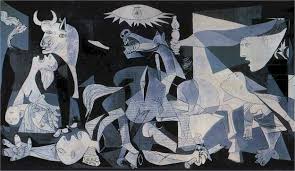Most people with any knowledge of Spanish history will know the story of Guernica - the small Basque town in Northern Spain that is at the heart of Basque culture. On Monday, April 26, at around 3.30 in the afternoon, when all of Guernica was at the weekly market, the Luftwaffe unleashed its bombs on Guernica in a chilling dress rehearsal for World War II.
The town wasn't a military target, but by its bombing, Franco and his German allies hoped to destroy the heart and soul of the Basque nation. Times correspondent George Lowther Steer told the world of the atrocity that was Guernica, and when Pablo Picasso read of it in France, the idea for his greatest and most well known painting was born. Picasso had been commissioned by the Spanish Republican Government to create a mural for the Paris Exhibition of 1937. He ditched his previous plans, and created a memorial to one of the worst acts of terrorism of the 20th - or indeed any - century.
Fast forward to 2008, and American sports writer Dave Boling rolled out his first - and so far only - novel. Entitled simply Guernica, at heart, it's a love story but it's not just a story of romantic love - it's love of a family, a nation, a culture, and above all, it's a testament to the sheer love of life that's exhibited by Spanish people in general, and the Basques in particular.
The first half of the novel tells the story of the Ansotegui family, their life on their farm above Guernica, and the meeting of Miren Ansotegui and Miguel Navarro, who was forced to flee from the Guardia Civil at Christmas, 1935. It's sometimes moving, and often funny. Boling is married to a Basque girl whose family fled to America at the height of the Spanish Civil War, and his understanding of and love of the Basque culture shines through every page.
The mood of the book switches on April 26, and the description of the bombing of Guernica is graphic and terrifying. You can almost smell the fires, and your heart breaks for the suffering these brave, proud people were forced to endure. However, the Ansotegui family - like the Basque nation - refuse to be destroyed, and their courage and determination is both humbling and inspiring.
It's an overworked phrase that 'you can't put a book down,' but it's true when it comes to Guernica. It takes my husband Tony forever to read a book - babies are born, potty trained and start pre-school while he's working his way through the average novel - but he got through Guernica in three days. When he'd read it, he said he wanted to go there and see it for himself.
I didn't exactly laugh at him , but I did wonder if he'd been overdoing it with the vino tinto and gone all sentimental on me. When I finished the book, I felt exactly the same, and so has everyone else I know who has read it. If you've read Guernica, tell us what you thought of it. If you haven't, you really should. It will make you laugh, it will make you cry, but above all, it will make you think.
